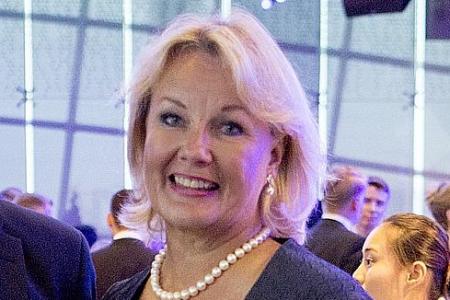Trust and a love of nature help make Finns happy, says ambassador
Finland's Ambassador to Singapore on why she thinks her homeland has been named the world's happiest country
Finland's Ambassador to Singapore Paula Parviainen said her countrymen are generally critical of their own country, with various opinions on policy matters.
So many among them were surprised when Finland emerged top in the United Nations World Happiness Report 2018 released last week.
This is the first time the Nordic nation has been named the world's happiest country since the first report in 2012.
Ms Parviainen believes the high levels of trust within Finnish society and the mentality of the collective among the citizens helps them thrive, along with the fact that they all love nature.
It has allowed for policies like progressive taxes where the rich pay more. Finland also has a value-added tax of 24 per cent, which is among the highest in Europe.
The revenue collected helps make basic education free and healthcare is heavily subsidised, which are the cornerstones of Finnish society, Ms Parviainen told The New Paper last Friday.
"I think it is the basics - the education system, that explains a lot of our success. And it is equal opportunity for everyone," said the 56-year-old.
"Of course the ones who are well off have to pay a considerable amount of taxes, and some are unhappy about that. But in the end, still, they understand that nobody needs all that wealth, and you cannot be happy unless you share it."
Ms Parvianen said Finns believe in the collective because they understand it is "very seldom" that someone is successful without teamwork.
"Why should someone in a company earn a million and others a few thousand, since they both help the company to be successful? Of course the one who earns the million makes the strategic decisions but still, the gap in the salaries is maybe not right," said Ms Parviainen, who has been head of the Finland mission here since 2015.
LEAST HAPPY
The latest index has Burundi and Central African Republic as the least happy countries for the second successive year.
Singapore dropped eight places to 34th.
Ms Parviainen's first contact with Singapore was in 1986 as a Finnair cabin crew member.
While her two sons - one aged 26 and the other 28 - are in Finland, her husband is here, after he took a leave of absence from a government job.
During the hour-long interview at the Finnish embassy at United Square, Ms Parviainen noted the many similarities between Singapore and Finland, which celebrated its 100th year of independence from Russia last year.
Both countries have a population of about 5.5 million, and are among the highest in many indices, like trust in the police, mathematics, reading, science scores (Pisa rankings) and corruption perception indices.
There are also opportunities for mutual learning, with the two countries having to plan for an ageing population and shrinking birth rate.
Singapore's total fertility rate was 1.16 last year, while Finland's rate went down to 1.65 in 2015.
The mother of two believes the Finns' love of nature also helps their mood.
"The Finnish connection to nature is also something that is really relaxing - hug a tree, pick some berries or mushrooms or go swim in the lake or go jogging and skiing."
Rather than making things bleak, the long dark winters - with temperatures going as low as -20 deg C - make Finns more adaptable.
"The change of seasons gives us incredible amounts of energy and variation and the possibility of doing different things... It is actually a richness," she said.
"I think the whole question of happiness is a question of attitude. Do you only see the rainy days or do you see the bright sunny days in between?
"To sum up, the equal opportunity system, the free-for-all education, gender equality, closeness to nature, safety and security, and having all these safety networks - this makes Finland what it is today."
Get The New Paper on your phone with the free TNP app. Download from the Apple App Store or Google Play Store now



